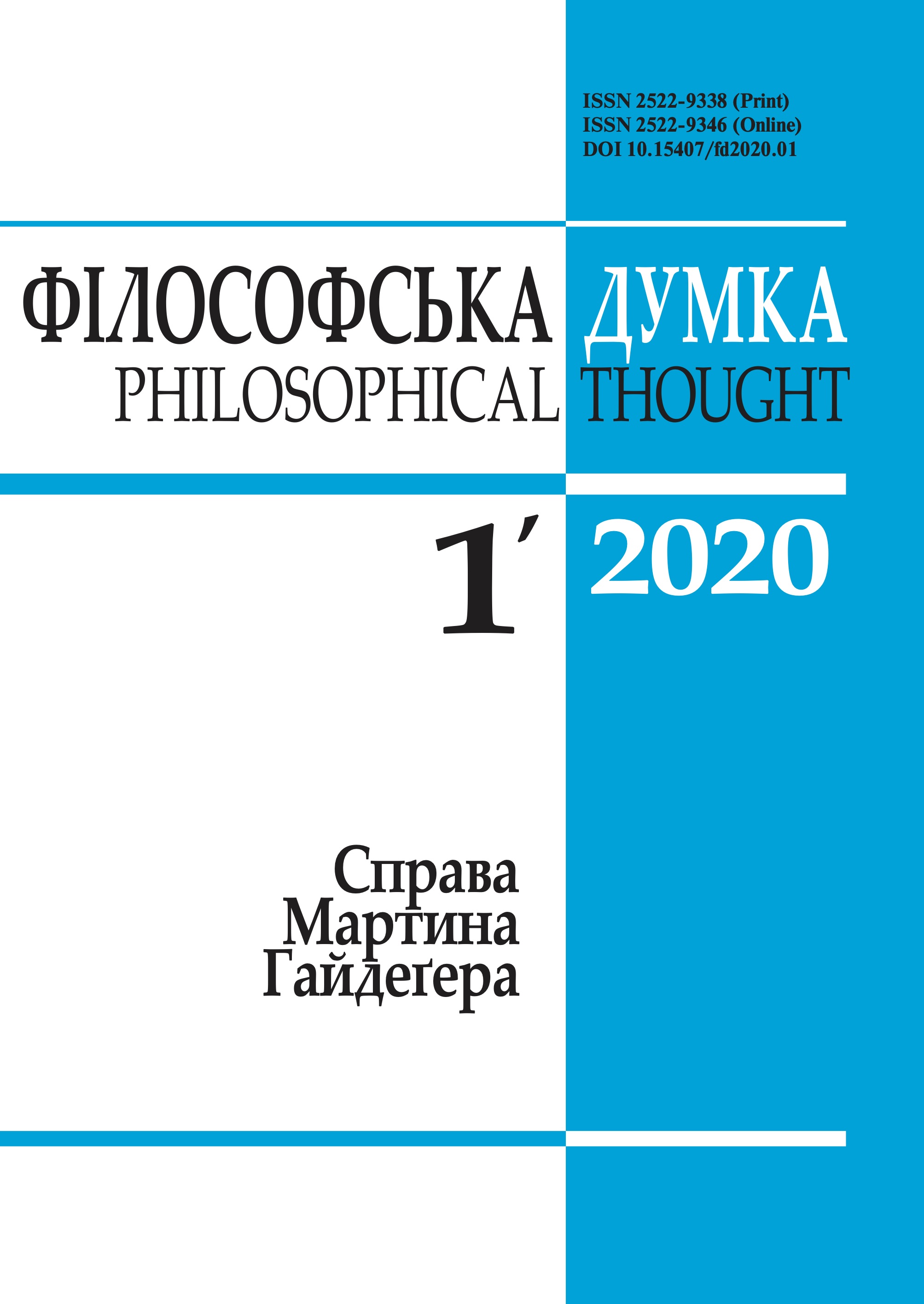Anatolii Akhutin. Heidegger: the case of philosophy
DOI:
https://doi.org/10.15407/fd2020.01.026Keywords:
Heidegger, phenomenology, Jewry, Nazism, European PhilosophyAbstract
The name of M. Heidegger is associated with a serious scandal in modern philosophy. This person, who is recognized as the greatest philosopher of the 20th century, turned out to be a staunch opponent of "world Jewry" and a supporter of the "National Socialist Revolution." Are these odious beliefs: a trait of his personalities, his ideological conformism? Or are they organically woven into his philosophy? Heidegger's philosophy is deeply rooted in the very center of European philosophy. And it attracts all of its history, classical ideas and concepts in the course of its thought. Heidegger "introduces Nazism into philosophy”, but is not this dangerous possibility hidden in the bowels of philosophy itself? What is M. Heidegger as the case of philosophy itself?
In this article, the author describes the contexts in which the case - the case, the fall, even the collapse - of Heidegger becomes philosophically significant. Appealing to the concept of the late Heidegger das Ereignis (event), it is actualized that philosophical thought, understood as the experience of being, belongs to the contemporary and here relates to all such a whim of the experience of the modern. It is a paradoxical combination of boundary involvement in what is happening and boundary abstraction. Thus, the purity of the article is devoted to the analysis of the events of the early twentieth century, mainly in the intellectual context.
The author then turns to Heidegger's philosophy, analyzing the following key points: the phenomenological turn of philosophy and its ontological deepening by Heidegger, the destruction of Kantian criticism and Cartesian double-substance; elimination of abstract reflection.
Finally, the author argues in detail why, in his view, the philosophically necessary course of Heidegger's thoughts and the paths echoed by his own course of this authoritarian personality coincide.
References
Glukhov, A.A. (2018). Philosophical clarity: Heidegger is equal to Hitler. [In Russian] Logos, 28 (3), 91-120.
https://doi.org/10.22394/0869-5377-2018-3-91-117
Moler, A. (2017). Conservative revolution in Germany. 1918-1932. [In Russian] Moscow: Toten- burg.
Payen, G. (2018). From the Black Notebooks to the End of the "Heidegger Case"? [In Russian] Logos, 28 (3), 73-74.
https://doi.org/10.22394/0869-5377-2018-3-51-85
Safranskii, R. (2005). Heidegger: German Master and His Time. [In Russian] Moscow: Molodaya gvardia.
Fryer, H. (2009). Revolution from the right. [In Russian] Moscow: Praxis.
Heidegger, M. (2001). The main problems of phenomenology. [In Russian] St. Petersburg: Higher religious-philosophical school.
Heidegger, M., Jaspers, K. (2001). Correspondence 1920-1963. [In Russian] Moscow: Ad marginem.
Etkind, A.M. (1995). Sodom and Psyche. Essays on the intellectual history of the Silver Age. [In Russian] Moscow: IC-Garant.
Etkind, A.M. (1993). Eros of the impossible. The history of psychoanalysis in Russia. [In Russian] St. Petersburg: Meduza.
Arendt, H., Jaspers, K. (1992). Correspondence 1926-1969. San Diego, New York, London.
Heffernan, G. (1916). Heidegger's critique of Husserl in his Black Notebooks. HORIZON, 5 (1), 24-25.
https://doi.org/10.18199/2226-5260-2016-5-1-16-53
Heidegger, M. (1953). Einf hrung in der Metaphysique. T bingen: Niemeyer.
Heidegger, M. Gesamtausgabe (GA). Frankfurt am Main: Vittorio Klosterman.
Travny, P. (1914). Heidegger und der Mythos der j dischen Weltverschw rung. Frankfurt a. Main: Vittorio Klosterman.
Downloads
-
PDF (Українська)
Downloads: 464
Published
How to Cite
Issue
Section
License
Authors who publish with this journal agree to the following terms:
- Authors retain copyright and grant the journal right of first publication.
- Authors are able to enter into separate, additional contractual arrangements for the non-exclusive distribution of the journal's published version of the work (e.g., post it to an institutional repository or publish it in a book), with an acknowledgement of its initial publication in this journal.
- Authors are permitted and encouraged to post their work online (e.g., in institutional repositories or on their website) prior to and during the submission process, as it can lead to productive exchanges, as well as earlier and greater citation of published work (See The Effect of Open Access).


